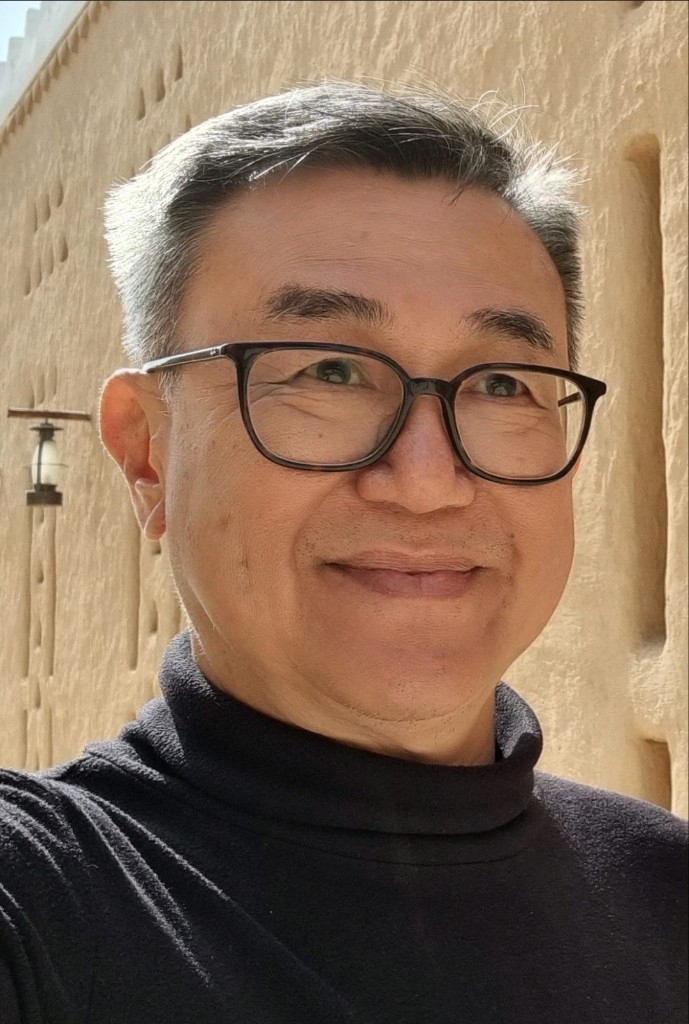
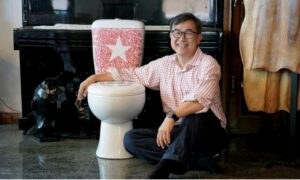 Jack Sim, globally known as Mr. Toilet, is a Singaporean social entrepreneur and the founder of the World Toilet Organization (WTO) which promotes sanitation and toilet-related issues around the world. Sim was instrumental to creating World Toilet Day, which is celebrated every year on November 19th and (working with other groups) in getting the United Nations to officially recognize sanitation as a basic human right.
Jack Sim, globally known as Mr. Toilet, is a Singaporean social entrepreneur and the founder of the World Toilet Organization (WTO) which promotes sanitation and toilet-related issues around the world. Sim was instrumental to creating World Toilet Day, which is celebrated every year on November 19th and (working with other groups) in getting the United Nations to officially recognize sanitation as a basic human right.
About 1.7b people in the World do not have access to safe toilets and latrines, and 46m Nigerians defecate in the open. Sim, an Adjunct Associate Professor at Lee Kuan Yew School of Public Policy spoke with Babatope Babalobi on how the WTO intends to make toilets sexy and trendy, to address this global challenge.
Kindly tell us what the WTO do and how are its activities are relevant for Nigeria where open defecation is prevalent?
About 20 years ago, in 2001, the subject of sanitation was called water. There was no media coverage for the sanitation agenda. It was considered embarrassing to talk about toilets. Today, we’ve put the Sanitation agenda on the media center-stage, despite people still often calling it a Water agenda. People like charismatic agendas that are Blue and Green. They avoided sanitation because few people wanted to fund Brown agendas.
We need to liberate sanitation from water and make it visible.
I am going to the United Nations Water conference in March 2023, and lots of people are going there to talk about water, and they will talk a little bit about sanitation but not so much. I think our role is to make sanitation a very highly visible issue. You see, calling the sanitation agenda a water agenda is almost like saying Women’s problems are classified under Men’s. So all men are brothers, mankind, and then you forgot to talk about women until women’s liberation happened. We are glad that Sanitation is now liberated from Water although both are complementary to each other.
When people start talking about toilets and sewage treatment, they start talking about safety, health, tourism, income, and mitigating the pollution of the clean water in the river. They realised that people get sick when they put shit into the river, and also girls get raped when they don’t have toilet and have to go to the bush every day in the open. Girls also drop out of school and if they do not have a privacy place to change their menstrual pads.
Talking about toilet is embarrassing to many people.
Having toilets is important, but people forget to talk about it because it is considered embarrassing. Our job is to destigmatize it, and over the last 20 years, we have mobilised the world to pay attention to sanitation. We even created the United Nations World Toilet Day on the 19th of November which was adopted unanimously by all 193 members of the UN general Assembly in 2013.
Over the last 22 years, the global sanitation movement brought two and a half billion people access to proper sanitation, and the work is not finished because there is also the problem of sewage treatment.
About half of the world’s sewerage is still not treated, so we are working on that.
- We went to Brazil World Water Forum and successfully lobbied the Senate for a change of the law to allow foreign investment into their government-owned Water Treatment plants. The Brazilian government launched their bill at our World Toilet Summit 2019 in Sao Paulo, and by 2020, the law was passed. And now there are about 10 billion US dollars invested into the Brazilian sewerage treatment plants. We expect these investments to continue growing to USD 150 billions when all sewage plants are fully invested.
- In Nigeria, we hosted a World Toilet Summit last year with the Minister of Water Resources, the Office of the President of Nigeria, and the Vice President. All 36 states participated online and many Governors came physically to our World Toilet Summit in Abuja. We have a manifesto and a work plan to end open defecation by 2025. We think they will probably be more likely to achieve it in 2030. However, I think that it can be done. So there is a lot of political determination. I hope, after the election, this continues.
In terms of the international governance structure of the WTO, what is it like? Is it centralised in Singapore, and do you have national structures?
Of course, we work with local people, and they take ownership of their own country’s issues and challenges. The local government will follow up, but we are on advisory. We can bring a network of other solutions already found in other countries to apply wherever it is useful and adapt it to local conditions.
We have the convening power to bring all stakeholders to the table and align our aspirations as a collaborative ecosystem. We can influence policy with very convincing narratives and governments do listen to our advice.
We are not a funding agency, so we match solutions already found elsewhere. That way, you do not have to reinvent the wheel when we share what is already proven and working well.
Do you have a national chapter of WTO in Nigeria?
In Nigeria, we work with Organised Private Sector (OPS) WASH, a private-sector NGO and the Sanitation and Hygiene Fund of Geneva. We knew them through the Sanitation and Water Alliance (SWA), and we are both members. We work with the Nigerian government itself, the Federal Ministry of Water Resources, and I think, after the 2023 general elections in March, we will continue to work with them. And then whoever wants to join in, as long as they are serious, we are very happy to spend time with them.
So you would like to see all these groups and institutions coming together to form a local chapter in Nigeria, or do you think a local chapter will not add value? Maybe it is going to duplicate what the National Task Group on Sanitation (NTGS) is currently doing?
We do not have to keep creating layers of control and channels. The most important thing is to facilitate people rather than to command them. So if whatever has already been done needs more knowledge, information, and network, we should facilitate it. And then they continue to do it themselves rather than you add another group and end up with more committees, meetings, administrative things, and elected officers. That is going to be so laborious. Keep it simple and solve it with passionate people.
What were the major takeaways of the World Toilet Summit held in Nigeria? And how are you implementing those takeaways?
Yes. So the takeaway is that you need the private sector and public participation. You need the people to want the toilet, so you have to drive the demand so the market can supply it.
People prefer to spend money on religion and socials rather than toilets
You know, sometimes you assume that poor people do not have money, but they do have some money. It is the priority of which place to spend the money. So they could spend the money on festivals, religious events, alcohol, snacks, and the lottery. Once you have the priority that they must have a toilet before all other things, suddenly the money goes to getting a toilet.
For some people, we experience that if they want a toilet, they will even create new income to get the toilet. For example, they may rear some chicken and sell it and make money to build a toilet slowly, or they might start some entrepreneurial thing, as we have seen in Brazil, people producing detergent from concentrates and selling them to make money to build a toilet.
So you know, if you want something, you will be prioritising it. So I think driving demand for sanitation is very important because the water demand is a no escape route, as everybody needs water. However, the demand for sanitation sometimes is affected by the habit of defecating openly, and people do not even think of having a toilet. The moment they want a toilet, either because of health hygiene, privacy or just mere jealousy that the neighbours have a toilet, they slowly build it themselves.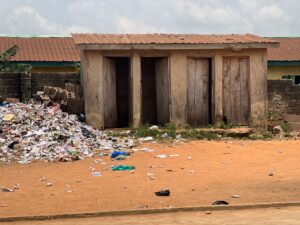
I read online that after the World Toilet Summit was held in India, it triggered so many actions that led to the construction of over 110 million toilets and removed India from the position of being the number one open defecator in the world. In Nigeria, the World Toilet Summit seems not to have triggered a similar multiplier effect?
We started the Indian experience in 2007 with the first world toilet summit, and the President came, as well as six Ministers and the Crown Prince of the Netherlands. The effect was not within a few months. It just slowly happened over years. After the World Toilet Summit 2007, politicians realised they could win an election by promising people toilets. So they started challenging each other by promising toilets to win the election. So when they prepare for an election, there is a timeframe; in India, it is a country with continuous elections. You know you have Federal, State, and all kinds of elections. So, a lot of the election is done using the agenda of toilet construction.
In the first phase is that there is a lot of corruption in the country. Sometimes the money meant for toilet construction is being embezzled while papers are signed for toilet construction, but the agenda starts the process.
Nigeria, like India must politicize toilets to overcome open defecation.
Eventually, the new Prime Minister won an election, promising everyone toilets, and he built 110 million toilets in India. This is the biggest toilet construction project in the history of mankind. Although there is no perfection, the trend of politicians using the toilet as an election agenda is very effective. On top of that, movie stars, celebrities, and singers are used at the national, state, and franchise levels (village levels) to aid in toilet construction. I am very happy with our progress in India, China and Brazil.
So I think that this is a campaign that needs to be driven after the Nigerian election. So the new politicians have to get organised because from the last World Toilet Summit to the time the new politicians go into the office is about 6 months. Now the WTO will have to work with new politicians because some politicians, like the Minister of Water Resources and his Permanent Secretary, have done two terms and need to step down.
However, the seat of sanitation is very important, and everybody should know how to use it for their purpose for safety, enjoyment, privacy, winning elections, celebrities, visibility for bonus impact creation even for academia to do research.
We are talking to Fountain University to see if we can make a Nollywood movie on toilets. So I have written the storyline, and now we are considering raising funds to make this just like in India. In India, they make movies that become blockbusters, and everybody watches the movie, and then they start to want to have toilets. This is a campaign that takes years.
In 2007, we started to plant the seed in India, and by 2019, they had completed building 110 million toilets. We will continue to work in India with World Toilet Colleges as we have built six World Toilet Colleges and trained toilet cleaners to be professionals in areas like how to empty the toilet when it is full. This was a partnership with Reckitt, a company that owns the brands Harpic and Dettol.
So what are the key messages of the last WTO held in Nigeria?
- We should make people want to have a toilet. That is the number one key point. Once they want a toilet, the demand will drive the supply, and they will prioritise it. They will also take out their own pocket money to build the toilet. The government can facilitate the construction of these toilets, but we do not have to keep waiting for them. The people have to drive themselves, and businesses also have to come in, and It has to be a whole market ecosystem. Once the ecosystem is efficient, the market will function with supply demand, and you will buy a toilet because you believe you need one. Today, if you do not think you need one and you have been openly defecating for generations, then nothing will happen.
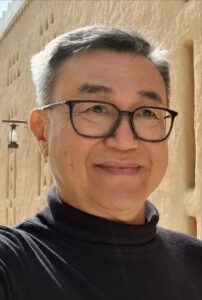
Make toilets sexy.
- So make toilets sexy, objects of desire, and people want to have toilets, and the rest will follow.
So, you don’t agree with critical views that the World Toilet Summit online was a jamboree and distanced from the locals in villages where the challenge of Open defecation is predominant?
Do you know that the locals are also very interested? We do not have to push them. We need to generate energy. For example, Jigawa has already become an open-defecation-free state. People in Kaduna are working very hard. Also, people in Rivers state and Cross Rivers state are working hard, and I think it is important not to be pessimistic and plan how things should be done by asking people.
People should not wait for government to provide toilets but drive the demand for toilets.
When they know their problem, they should be able to own it and think about it. However, if they are still waiting for the government to give them a toilet before they can use a toilet, then when the government provides them with a toilet, they will not be able to maintain it because they did not want it in the first place. So you have to drive the demand, and then they will drive an efficient market
Nigeria is not likely to achieve its target of ending open defecation by 2025. What do we need do achieve this by 2030?
You know, when I go to the UN, Nigeria is an African country that is very enthusiastic about sanitation. Maybe it is because the Minister of Water Resources is driving that, and I hope that the new minister will continue the drive. Suppose you have a few leaders interested in sanitation, things will go very fast. This is all about leadership.
If you have somebody who has other priorities and does not see sanitation as being important, then it might derail. So local ownership, leadership, and finding a few people with the drive towards sanitation at every level, such as the national, state, and village levels, is very important.
How do you do that? You do that in every country.
- For example, in China, we started with the tourism toilet. We tell them that if they have clean toilets, they will have more tourists and the tourists will come and spend money. This will create jobs and bring the local economy to a higher level. All the different tourism boards of different provinces say that it made sense and started investing in only tourism toilets and suddenly over the years from 2004 until 2023, all tourism toilets in China are now super clean. That is a transformation, and although it took a long time, about 18 – 19 years, it worked. A big country with China, with about 1.4 billion people, now has everything working.
- Now we start working in school sanitation. We built 15 Rainbow School Toilets. We also taught the children to clean and take care of the toilet themselves, advising that no cleaners should be employed to maintain the toilet. The Chinese government saw that this model worked, and the student maintained the toilet very well and introduced it to 215,000 schools in China. So this requires a combination of political will, driving it down to the local level, and if everybody plays their part, you get toilet dignity and hygiene. Because you have to go to the toilet, why don’t you enjoy the safety and experience of comfort in the toilet?
What is the specific approach and model of the WTO? Take for instance the Community Led Total Sanitation (CLTS) approach, there is a standard process for implementing it. What model or approach have you practised for the WTO, or will you recommend so that any organisation can take it up to accelerate sanitation coverage?
We are a movement and drive sanitation as a main agenda so that CLTS and everybody else are all driving this movement. It is not about giving orders; it has to be an adaptive process where you listen to the person you are talking to and know their interest. Some people might not be interested in sanitation or school toilets, and they might be interested in tourism, making money, or winning the election.
So you adapt the message to the person according to their motivation. Firstly, you go to the ones who are more interested before going to those who are not interested. You do not want to waste time talking to the ones that are not interested. Once the one who has energy and is interested starts to drive the agenda, then the others will follow.
People rather than government need to prioritize toilets.
As I try to emphasise in this interview, make the toilet a priority for the people, not the politician. Once the people want the toilet, the politicians know how to promise and deliver them the toilet to win their votes and the election.
How is your approach complementing CLTS? Some people may argue that that constructing toilets or toilets alone cannot end the sanitation crisis.
The same thing I have been telling you. I hope you have been listening. I want to repeat, make people want to have a toilet first. If you do not make people want a toilet first, there is no need to supply the toilets. However, after CLTS, people usually want to have a toilet. Although there will be different types of people like people who do not have money, they just dig a hole, put 4 sticks, and wrap a piece of canvas around it, which is okay. Also, other richer people might want to build a very nice toilet with bricks, and then somebody has to supply them. 
So what happens after CLTS if there is no efficient construction supply? A few months later, the toilet collapses, and they had to go back to open defecation because they thought the toilet model did not work. So we need to do CLTS and advocacy to drive demand. We also need to drive supply. You will have a sustainable demand if all the pieces work well together.
There is a big water conference in New York, March 2023. So what messages are you taking to this conference as one of the world’s leaders in the sanitation sector?
I will tell you that about 20,000 people usually attend a conference like this. That is the best place to meet the people you want to work with and network with. Spend 10 – 15 minutes with people of the same mutual interest and get their contact to follow through. For conferences like this, it will be about messages on water, and then after that, everyone will be so busy with other actions running around. When you finish the conference, you start the real work with people you have networked with. You meet them and say, “We met and wanted to do something. I heard you are working on this item, and I think we can replicate that to another few 1,000 new locations”, and all that.
This is how big conferences like the World Economic Forum and UN Water Conference work. For the conference itself, if you want to listen to messages, you can watch the videos later on. However, the network is the highest value.
We have a lot of coastal slums in Nigeria. what kind of technology you use to provide toilet facilities for coastal communities, the villages sitting on water?
If you download the book “The compendium of sanitation technologies“ you will find all the available technologies. If you have a high water table, or even in a water village, you have either an elevated toilet or a system where you can dispose of it properly. There are also situations where people are so habitual that it is very hard for this to work. For example, in Cambodia, at the Tonle Sap lake, people keep defecating into the lake. They even wash their clothes and do other domestic chores in the lake. So I think those are quite challenging issues. However, over the years, they started relocating some people on shore and solved the issue over a long period.
You cannot dig a pit latrine with a high water table. You can use biogas and other treatments for dry toilets and many other solutions available in the compendium of sanitation technologies. In this book, you will find the one suitable and also the one that is affordable because if it is too expensive, you also cannot afford it.
Urban areas in Nigeria, are largely serviced by onsite sanitation systems or non-sewered sanitation systems which they dispose of in water bodies. What are your suggestions to solve safe transport, disposal, treatment and reuse of fecal sludge generated from this system?
I think we call ourselves the World Toilet Organisation and not the World Sanitation Organisation because, if you say sanitation, the ordinary person has no idea what you are talking about. Maybe the engineers know what you are talking about. However, when you say “toilet”, then immediately they understand.
So, from talking about toilets, you have to talk about treatment, handwashing, hygiene, maintenance, cleaning, soap supplies, toilet paper, washing, and even nail clipping. So if you ask me about a particular place, I would rather know the actual context of the culture of the people. Like what are they doing without the solution? What is these practices’ cost and impact/implication on their health? Do they even see it as a problem?
And then, from their mindset, there is the aspiration to say, I would like to solve this problem because here is the problem. Then you start designing the solution according to their perception in their community. Instead of saying, “I do not need to interview you, I am just coming up with a solution”. I think that is the wrong way of approaching it. We need to involve the people so that they’ll use it and maintain it as they own the solution.
Will you agree with the view that the work of the WTO may appeal more to the urban private sector firms in the sanitation economy. So how can we mobilise private funding and market instruments to finance the sanitation challenges in rural areas?
Our job is not rural or urban, but all of them. Our job is to bring political interest and public interest to sanitation. If they are excited about it, they will take action and take ownership. They are not stupid, you know. They do not have enough money to take care of everything in their life, but our job is to move the priority of having toilets higher. Do not have the assumption that they are just sitting there waiting for you to bless them with a present. They own their life, and once they realise that if they pay attention to hygiene, they might not have to pay for their children’s health care or have reduced productivity due to having to give attention to a sick child
Let’s make toilets trendy!
If there is a trend that people now have toilets instead of open defecation, they will drive themselves. However, if they keep waiting for help and funding from donors and charities, it will not work unless they are self-driven. It does not matter if it is rural or urban. It comes from their interest in wanting a toilet.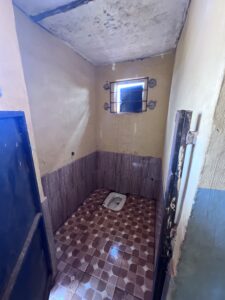
Rural people can use their manpower to dig a hole and a pit, build with bamboo, or use coconut leaves to weave baskets, as I have seen in the Philippines. It costs no money. In the Philippines, the village chief mobilised everybody to weave with a coconut basket, and then they shit into the basket and bury it. And then they keep weaving the basket to make toilets which is very simple, but because they want it, they are weaving the basket. However, nothing will be sustainable if they keep waiting for the government.
Do you think Nigeria is a very difficult country in terms of implementation. What have been your experiences working with Stakeholders?
Nigerians are the same as anyone else in the world. They want happy and healthy families, educated with food on their table, electricity, water and healthcare. I think when you have too much subsidy money, corruption happens. However, if you drive it as market efficiency, the people will spend their money. So it will not be difficult because when there is demand, there is supply, so whether it is cheap or free, all you need to do is make them want toilets and proper sanitation treatment. Corruption happens when there is too much money, and sometimes donations worsen it.
So are you advocating that instead of calling on government to construct public toilets , we should be talking about mobilising the people to demand toilets?
We should make toilets sexy and desirable. Same as you have described in the CLTS. They find out that not having toilets is disgusting, and they are eating each other shit through the cross contamination, and they do not want to eat each other’s shit anymore; instead, they want to have toilets. I think this is the way to go. If you keep saying, “somebody must give it to me because it is not my problem, it is the government’s problem”, I think that is the wrong way of approaching it. It is almost like expecting somebody to take care of my children. You have to take care of your own. The best is an efficient market, but it comes from driving demand, which we have been doing for over 20 years. 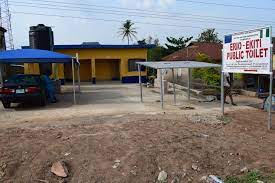
You are known as Mr Toilet all over the world. What efforts are you making to replicate this vision so that we have so many Mr and Ms Toilet worldwide so that the drive will continue by the time you leave the stage and retire?
It is already happening. In 2001, there was no media coverage, and now the media is covering it all the time. The Mr Toilet message is now being heard everywhere and by everyone in every corner of the world. Local people are taking these messages and becoming local champions. You see, the Prime Minister is the champion for the Indian toilet. The President is the champion for China’s toilet. Can you imagine that when you combine the two, you have 2.8 billion people, which is already almost half of the world’s population, about 32% of the world population. We need national, province, state and village champions so whoever picks it up can run with it.
Take Brazil, for example, the people that run it are the sewerage treatment companies who want to do business and attract Chinese investment into Brazil. Nigeria can do the same. They can expand their sewerage treatment plants with public-private partnerships and give some of the shares to the Chinese company while keeping the majority for themselves. To reorganise and make the sewerage treatment company efficient, you have to lay off some dinosaurs sitting around doing nothing, change the management, and run it profitably.
It is possible, but we must copy who has done it and replicate it in Nigeria. I do not think that Nigerian are different from anybody else. It is the same human nature to aspire to have a peaceful and quality life and enjoy family and friends.
However, the markets are not like that. Donation money could be corrupted. Nevertheless, the market money is very smart.
So, do you want to see the next President of Nigeria becoming the number one champion for toilets in Nigeria?
Oh, that will be very wonderful. If it is possible, we will meet him so that the new President can be the champion of Nigeria’s toilets, sanitation and WASH. I think that will be a very, very big step.
I am meeting the Nigerians in New York at the UN water conference. Our session is a joint venture with Nigerians. So our meeting is with Federal Ministry of Water Resources Minister Adamu Suleimman, executives, and directors. We will follow up from there and seek his guidance on how to talk to the new President.
What are your final comments as we round up this interview?
Africa is a promising continent, and Nigeria is one of the biggest African states. If we can solve it in Nigeria, it will set an exemplary model for all the other African countries.
I can honestly say I feel so confident about the Africans because they own a lot of natural resources that the world needs. What you need to do is to sell those products with value-added processing as a finished product, rather than sell them as raw materials. That way, you can earn income, which will create velocity of money with multiplying effect and create high-quality jobs. You can stop the Western people from exploiting you by cheaply buying your raw minerals and agricultural products, then selling the processed goods at very high prices. About 100 times more expensive. Starbucks sells the coffee for $6, but you do not get 5 cents for your coffee bean. So do not be bullied and do not export raw materials but process them instead. Then you can get out of poverty and have money to buy toilets.
Leave a Reply